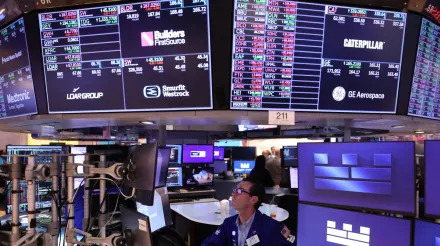You've got to hand it to Herbert Spencer — the guy had a way with words.
The British biologist and philosopher, who died in 1903, is credited with originating the expression "survival of the fittest," which he coined in "Principles of Biology" after reading Charles Darwin's 1859 book "On the Origin of Species."
Related: Trump election win may put Fed interest rate cuts at risk
Spencer is also responsible for the phrase "there is no alternative," which reflected his belief that Darwin's theory of evolution and natural selection could be applied to human interactions and society.
It was a line he used often in response to critics of capitalism, free markets, and democracy.
Politicians used the acronym TINA to justify policies of fiscal conservatism and austerity. The concept has been strongly associated with former British Prime Minister Margaret Thatcher.
Investors often invoke TINA to justify owning stocks even when they deliver lackluster performance, arguing that other asset classes offer even worse returns. The “TINA Effect” occurs when stocks rise only because investors see no viable alternative place to put their money.
💰💸 Don’t miss the move: SIGN UP for TheStreet’s FREE Daily newsletter 💰💸
That concept was challenged significantly not too long ago. When the Federal Reserve made a series of interest rate cuts and bond yields surged, many thought TINA could be dead on arrival because investors could garner stock-like returns by owning and holding Treasuries.
“TINA is dead,” Jason Trennert, chief investment strategist at Strategas Research Partners, said in 2022, according to Morningstar .
Analyst says investors stick with stocks
Trennert, who helped popularize the term for the stock market in 2013, said, “Investors are going to have other, very viable alternatives for their savings.”
Phil Mackintosh, Nasdaq's chief economist, said in February 2023 that the TINA trade was over, “with increasing flows into fixed income ETFs as higher rates mean yields on bonds have risen.”
Related: Fed Chair Powell digs in for a fight as markets debate Trump economic plan
"Retail ETF flows seem to confirm the TINA trade is over," he said. "Bond ETFs are seeing persistent inflows across the broad maturity and credit spectrum. Since the middle of 2022, retail has been a more net buyer of fixed-income ETFs, adding to $7.9 billion."
Market analysts were pointing to a new acronym, TARA. which means “there are reasonable alternatives.”
Veteran analyst Carley Garner has a different take on TINA .
In a post for TheStreet Pro, she wrote that TINA "encouraged overzealous risk-taking because risk-off assets weren’t producing yield, and it worked tremendously for investors."
"This was by design," said Garner, a long-time futures and options broker and strategist with DeCarley Trading, a division of Zaner Financial Services. "Keeping interest rates low is a method of monetary policy intended to push dollars into riskier assets that promote economic growth, such as stocks. It was a winning strategy by central bankers."
Garner said that, in theory, TINA should have died with the monetary policy that created it, but it has lived on.
While Treasury securities paying 4% to almost 6% on various parts of the curve should have been enough to attract money away from stocks and into the safety of U.S. government bonds, she said, that isn’t what happened.
Veteran trader concerned about stock market risks
"Instead, market participants have become increasingly drunk on risk and alpha," Garner said.
Alpha is how much a stock returns above a benchmark, adjusted for risk.
Related: The Santa Claus rally has started early this year
"Anybody practicing risk management and diversification has been punished harshly, while aggressive portfolio allocations have worked like a charm," she said. "Is this the new norm, or is it a temporary anomaly that will eventually wreak havoc on our retirement plans? I hope I am wrong, but I believe the latter is probable."
Garner says TINA may take on a different meaning in the coming year.
"Should volatility increase and persist, investors will indeed look for safer assets," she said. "With FDIC insurance covering $100,000 and SIPC insurance limited to $500,000, the best risk/reward play for larger players could eventually be boring U.S. bonds."
At a current rate of more than 4% on the 10-year note, she said, "investors get paid to wait with a very high probability of return of capital if held to expiration."
"This isn’t as sexy as a tech stock or a triple-leveraged ETF, but investors should always be mindful of the risk taken to achieve reward," Garner said. "The risk of being long and wrong in the stock market is much greater than the prospects of further long-term gains."
More Warren Buffett:
The strategist noted that Berkshire Hathaway ( BRK.A ) Chief Executive Warren Buffett seems to agree, as the Oracle of Omaha is raising cash by selling risk assets.
Buffett likes to say that "risk comes from not knowing what you are doing." Early this year, Berkshire Hathaway started selling Apple ( AAPL ) shares.
As of Sept. 30 the Omaha investment company ( BRK.B ) had cut its stake in the tech giant by two-thirds. Berkshire Hathaway has over $320 billion in cash before taxes, a third of its net worth.
Garner said that China and Japan unsuccessfully used monetary and fiscal policy without productivity as a long-term solution to generate outsized growth.
"I’m an optimist but I'm also a realist," she said. "We might not be immune to the same fate these two countries have experienced in the aftermath of risk asset bliss. Protect yourself."
Related: Veteran fund manager sees world of pain coming for stocks


